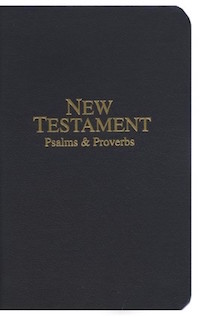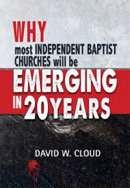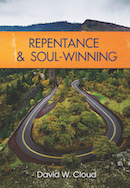866-295-4143, fbns@wayoflife.org

The oldest fragments of the Illiad and Odyssey date to the third century BC, at least 500 years after Homer. And the oldest entire manuscripts of Homer’s writings are from the 10th and 11th centuries AD, at least 1,800 years later. There are different editions of the stories, and it is impossible to know what the originals said exactly.
This is in great contrast with the documentary evidence for the New Testament.
The last book of the New Testament was written in about AD 90. The earliest manuscript portions of New Testament books date to AD 110-125, only a few years after the events.
Further, we have thousands of quotations from the New Testament books in the writings of preachers dating to AD 96 to AD 400. John Burgon collated 4,383 quotations from this period.
“These quotations are so extensive that the New Testament could virtually be reconstructed from them without the use of New Testament manuscripts” (J. Harold Greenlee, Introduction to New Testament Textual Criticism).
The majority of these quotations represent the “traditional text” as opposed to the Alexandrian text, but that is a different issue.
Consider a few examples:
Clement of Rome (c. AD 96) was taught by some of the apostles. He was an elder in the church at Rome beginning in AD 88, only 30 years after Paul wrote his epistle to Rome. In his letter to Corinth, Clement quotes from the New Testament at least 150 times, from Romans, 1 Corinthians, Hebrews, and five other books.
Polycarp (c. AD 115) personally knew the apostle John and other believers who were eyewitnesses of Jesus’ resurrection. In his letter to the Philippians, Polycarp quotes from the New Testament about 100 times. He quotes from Matthew, Luke, Acts, Romans, 1 and 2 Corinthians, Galatians, Ephesians, Philippians, Colossians, 1 and 2 Thessalonians, 1 and 2 Timothy, 1 and 2 Peter, and 1 John.
Irenaeus (AD 130-202) heard Polycarp preach and relate accounts from his time with John and other first century Christians. In his extant writings, Irenaeus quotes from every book in the New Testament except Philemon and 3 John. He said the apostles taught that God is the author of both Testaments.
In his letter to Florinus, Irenaeus wrote the following: “I could tell you the place where the blessed Polycarp sat to preach the Word of God. It is yet present to my mind with what gravity he everywhere came in and went out; what was the sanctity of his deportment, the majesty of his countenance; and what were his holy exhortations to the people. I seem to hear him now relate how he conversed with John and many others who had seen Jesus Christ, the words he had heard from their mouths.”
Thus we have the writings of men who knew the apostles and first century Christians personally and who quoted from the New Testament books.
This is irrefutable evidence that the New Testament existed then and that it was the same as the New Testament that we have today.
For further documentation see the chapter “The Bible’s Nature” in An Unshakeable Faith: An Apologetics Course, available from Way of Life Literature.
- Receive these reports by email
- www.wayoflife.org
______________________
Sharing Policy: Much of our material is available for free, such as the hundreds of articles at the Way of Life web site. Other items we sell to help fund our expensive literature and foreign church planting ministries. Way of Life's content falls into two categories: sharable and non-sharable. Things that we encourage you to share include the audio sermons, O Timothy magazine, FBIS articles, and the free eVideos and free eBooks. You are welcome to make copies of these at your own expense and share them with friends and family. You may also post parts of reports and/or entire reports to websites, blogs, etc as long as you give proper credit (citation). A link to the original report is very much appreciated as the reports are frequently updated and/or expanded. Things we do not want copied and distributed are "Store" items like the Fundamental Baptist Digital Library, print editions of our books, electronic editions of the books that we sell, the videos that we sell, etc. The items have taken years to produce at enormous expense in time and money, and we use the income from sales to help fund the ministry. We trust that your Christian honesty will preserve the integrity of this policy. "For the scripture saith, Thou shalt not muzzle the ox that treadeth out the corn. And, The labourer is worthy of his reward" (1 Timothy 5:18). Questions? support@wayoflife.org
Goal:Distributed by Way of Life Literature Inc., the Fundamental Baptist Information Service is an e-mail posting for Bible-believing Christians. Established in 1974, Way of Life Literature is a fundamental Baptist preaching and publishing ministry based in Bethel Baptist Church, London, Ontario, of which Wilbert Unger is the founding Pastor. Brother Cloud lives in South Asia where he has been a church planting missionary since 1979. Our primary goal with the FBIS is to provide material to assist preachers in the edification and protection of the churches.
Offering: Offerings are welcome if you care to make one. If you have been helped and/or blessed by our material offerings can be mailed or made online with with Visa, Mastercard, Discover, or Paypal. For information see: www.wayoflife.org/about/makeanoffering.html.





